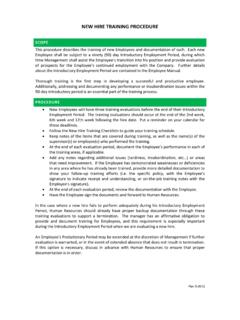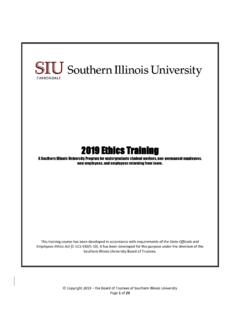Transcription of Welcome Packet Ideas - wcwpds.wiscweb.wisc.edu
1 Wisconsin Child Welfare Professional Development System (WCWPDS). New Worker Welcome Packet For Child Welfare Workers March 2018. WCWPDS. University of Wisconsin-Madison 8010 Excelsior Drive, Madison, WI 53717. Phone: (608) 890-3965. Fax: (608) 890-1594. Welcome Packet for Child Welfare Workers Table of Contents Greetings from the Director 2. Section I Your Professional Development 3. Pre-Service training 3. Foundation Courses 3. Ongoing training 5. Action Plans and Transfer of Learning 5. Continuing Education Hours (CEHs) 5. Certificates 6. Section II Policies, Guidelines and Expectations 6. Registration 6. Confirmation 6. Waitlist 7. Withdrawals 7. Substitutions and Walk-ins 7. Cancellation Policy and Fees 7. Paying for a training Session 8. Section III The training Day Expectations 8. training Days and Time 8. Planning Your Travel 8. Attendance 8. Complete/Incomplete Status 9. Technology Policy 9.
2 training Session Evaluations 9. Section IV About Us 10. Our Mission 10. Our Vision 10. Services 10. Approach 11. Scope 11. Section V Oversight and Collaboration 11. Steering Committee 11. WCWPDS Membership 12. Contact Information 12. training Center Addresses 13. 1. TO: New County Public Child Welfare Staff RE: Greeting from the Director Welcome from all of us at the Wisconsin Child Welfare Professional Development System! Our mission here is quite simple: promoting best child-welfare practice through education, skill development, strategic partnerships, and effective advocacy. Our vision and subsequent hope is that every child, youth, and family in Wisconsin experiences an enhanced quality of life complete with opportunity and supportive communities. We recognize that an enormous part of supporting that vision starts with you; that outcomes for the children and families we serve are only as good as the child welfare staff who support them.
3 Our role is subsequently to support you in being the very best professional you can be. We are committed to serving you -- our child welfare workforce -- through exceptional professional development opportunities that are available, accessible and of high quality at reasonable costs. Each of you brings a unique set of experiences and skills to the table, and we envision this as the strength of any professional development opportunity we may offer. The range of experiences we can draw from will be a valuable resource as TOGETHER we explore more effective ways to support children and families. We are committed to training approaches that reflect this, and our expectation is that you will encounter an atmosphere where you feel comfortable to ask questions, state opinions, and formulate arguments. The goal as I see it is that as a group we come out the other end of any professional-development opportunity having had both a fun and a useful educational experience that you can apply directly to your work.
4 As director of this program, I Welcome the opportunity to hear your professional- development goals and how we might improve those experiences. Please feel free to forward any questions, suggestions, concerns, or Ideas any time. My hope is that I get to know as many of you as possible as we progress through this professional-development journey together. Welcome aboard! Brent Nelson, Director Wisconsin Child Welfare Professional Development System University of Wisconsin-Madison School of Social Work 8010 Excelsior Drive Suite 100, Madison WI 53717. 2. Section I: Your Professional Development A career in public child welfare involves some of the most important, challenging and rewarding work anyone can do. We're here to support your efforts by providing you with quality learning opportunities to assist in your professional development and thereby benefiting the families you will be serving.
5 Pre-Service training DCF 43 became effective February 1, 2008. This administrative rule on child protective services caseworker training directs the new child protective services caseworker to complete pre-service training prior to being entered in the statewide automated child welfare information system as a primary caseworker. Until a caseworker has completed pre-service training the caseworker may only provide child protective services when accompanied by a CPS supervisor or caseworker who has completed pre-service training . Pre-service activities include completing the Wisconsin Department of Children and Families approved WCWPDS web-based Pre-Service training , as well as associated training activities as determined by each county agency. Those agency activities may include such things as agency orientation, job shadowing, and other related activities beyond the required web-based pre-service.
6 Your supervisor will guide you in understanding your county's pre-service requirements. The WCWPDS web-based Pre-Service training is designed specifically for newly hired child protective service staff in Wisconsin and provides opportunities for you and your supervisor to discuss aspects of the training modules. Those modules provide information on the following topics: introduction to child welfare, engaging families, safety, development and dynamics of human behavior, access, court, initial assessment, ongoing services, and permanence. The web-based pre-service training content can be accessed through PDS Online. Click to open Pre-Service Foundation Courses Click to open training Calendar After the completion of pre-service training , the WCWPDS offers skill-based Worker Foundation courses consisting of eleven classroom-style sessions. These standardized trainings focus on skill development and provide consistency and equity in the application of best practice in all seventy-two Wisconsin counties.
7 All newly hired public child welfare caseworkers with job functions in the areas of Access /CPS Intake, Initial Assessment, and Ongoing must complete 15 days of Foundation courses within the first two years of employment. 3. Together with your supervisor, use the Professional Development Plan to track your completion of Foundation Trainings. It is available on the New Worker Welcome and Orientation webpage at: Required Foundation Courses: Several of the Foundation courses are required for all child protective service workers. Engaging to Build Trusting Relationships (2 days). Supporting Change Through Engagement* (2 days). Case Practice with American Indian Tribes (2 days). Placement (2 days). Those who have access, initial assessment, and ongoing CPS job responsibilities have additional Safety related requirements as noted below: Safety in Child Protective Services Present Danger* (1 day).
8 Required for Access, Initial Assessment and Ongoing CPS. Safety in Child Protective Services Impending Danger* (2 days). Required for Initial Assessment and Ongoing CPS. Menu Option Foundation Courses: The remainder of the Foundation course sessions are selected by child welfare workers based upon consultation with their supervisor, their job functions and specialized responsibilities, and their individual practice skills and development needs. The remainder of the menu option Foundation course sessions include: Trauma Informed Practice (2 days). In the Best Interest of the Child: Making the Most of Family Interaction (2 days). Access (1 day). Initial Assessment* (3 days). Ongoing Case Planning* (2 days). Note: Some Foundation training sessions have pre-requisites and those are denoted with a * in the lists above. Be certain to complete the prerequisite, as described on PDS Online prior to attending the training .
9 Additional Required Online Trainings accessed through PDS Online. Understanding Child Sex Trafficking in Wisconsin: This required course is delivers crucial information to child welfare workers to support the identification of and responses to instances of child sex trafficking. Child and Adolescent Needs and Strengths (CANS): This training , required for all Initial Assessment and Ongoing workers, provides an understanding of the CANS assessment tool and how it is designed for decision support and outcomes management. 4. Ongoing training As you continue your work in public child welfare, the WCWPDS offers Special Skills and Topics course sessions to support your ongoing learning and development. Special Skills and Topics training provides in-depth training around a specific child welfare topic or practice. Course topics include legal, child sexual abuse, mental health, substance abuse, and ethics and boundaries.
10 PDS Online provides up-to- date information about topics currently being offered, as does the WCWPDS. website under the training Calendar tab: calendar/. Action Plans and Transfer of Learning At the end of each course session, you will spend time developing a training Action Plan. During training you will learn many new and exciting Ideas , concepts and skills. Action plans will assist in transferring your learning back to your job by: helping you identify important concepts or skills acquired in training , asking you to develop a plan that can be implemented at your agency based on the skills learned in training , and assisting you in identifying resources and barriers to the plan's implementation. Your supervisor is an integral part of the process of transferring your learning back to your job. After the training , make a copy of the Action Plan and give it to your supervisor. Keep the original for yourself.






